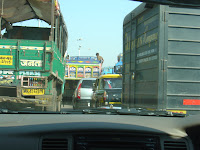China

Well I'm back after a week in China - Shanghai, Tianjin and Beijing. Was supposed to go to Haikou, which is on an island and I'm told its very nice, like Hawaii there - but plans changed and I was in the rather colder north instead. Every time I go to China it seems faster-paced, with ever growing opportunities. Shanghai, of course, is known for the incredibly fast growth of the Pudong area, with its high speed mag lev train, its impressive skyscrapers, and the Zhangjiang high-tech park, which is where our Shanghai office is located. Here's our intrepid China team in the office: Jimmy, Jonathan and Pu.
I was less familiar with Tianjin, which promises to be the next great economic development zone a la Pudong. Tianjin is the third largest city in China, behind Shanghai and Beijing (fourth if you count Hong Kong) - and practically no one's heard of it in the West! Its about 2 hours drive southeast from Beijing, near the coast. The Chinese government is putting massive amounts of money into Tianjin to develop infrastructure for manufacturing, ports, air travel, and corporate parks and incubators. They are very interested in healthcare and growing their biopharmaceutical industry as well.
While in Tianjin, we met with Dr. Liu Xiaocheng, president of the TEDA International Cardiovascular Hospital, the largest in Asia with more than 600 beds and 16 operating rooms, performing 10,000 surgeries a year. The interesting thing about this hospital is that, under Dr. Liu's guidance, it serves both the very very rich and the very very poor - and both get the same quality of medical care. He has set up the hospital to offer 6 classes of service, which deliver different levels of amenities to patients - but the same, high quality of medical care to all. In this way, the wealthy patients subsidize those who can't pay. At the highest level, one can get an incredible suite of rooms, including a conference room, office, private indoor garden, private gym, full kitchen - for $3200 USD per day. But for only about $6.70 per day, one can get a bed in a shared room (2 patients to a room) and the same quality of care as the $3200 patient. Dr. Liu has a special program to treat orphan children with heart problems, which he is very proud of. He says: "Its just like an airplane. In the front of the plane they have the first class. In the middle, business class. And at the end, economy class. But they're all going to the same destination. It's the market!" Very cool. I'm sending them a check for the orphans, but they couldn't figure out how to take a US contribution while I was there.
 Tianjin itself is a nice-looking city. It was an old colonial city, and its active commercial and manufacturing environment included many European concessions in the 1800's. Here's a nice link with old pictures. It featured prominently in the Boxer Rebellion of 1900. The architecture of the old part of the city is a charming mix of Chinese and European, the streets are lined with old trees and old-fashioned streetlamps. I was sorry I could not spend more time in this part of the city. I was told that Herbert Hoover spent 20 years in Tianjin as an engineer before returning to the US to become president. (My Chinese hosts were a bit dismayed when I told them that Hoover did not have the best reputation of all our presidents, having been tagged with responsibility for the Great Depression. Oh well!)
Tianjin itself is a nice-looking city. It was an old colonial city, and its active commercial and manufacturing environment included many European concessions in the 1800's. Here's a nice link with old pictures. It featured prominently in the Boxer Rebellion of 1900. The architecture of the old part of the city is a charming mix of Chinese and European, the streets are lined with old trees and old-fashioned streetlamps. I was sorry I could not spend more time in this part of the city. I was told that Herbert Hoover spent 20 years in Tianjin as an engineer before returning to the US to become president. (My Chinese hosts were a bit dismayed when I told them that Hoover did not have the best reputation of all our presidents, having been tagged with responsibility for the Great Depression. Oh well!)
Back in Beijing last Friday, where I stayed just one night before flying home. Long enough to have a delightful dinner at a pretty good Yunnan restaurant with my friend Zhang Quen (R) and my new Burrill colleague Wang Pu (L). I like most Yunnan food, but this place had not one but TWO kinds of worms (deep fried bamboo root worms and fried fireroot worms) on the menu - gives a whole new meaning to the word 'grub'!! (Click here for an interesting newsletter on edible insects (yup, they have recipes), and here for the website of the Research Institute of Resource Insects - I kid you not, in Kunming, Yunnan province, they do research on edible insects!) Anyway, we passed on the worms, but did enjoy a bottle of Great Wall cabernet which was not California, but passable. Here are my charming dinner companions - to friendship, with no worms!




